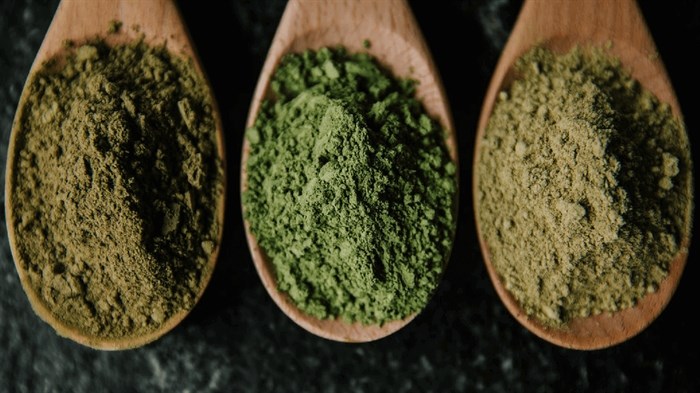
Kratom is a plant native to Southeast Asia that is available on the internet and sold in the form of a pill, capsule, powder or tea leaves.
Image Credit: Bing.com/images
December 05, 2021 - 2:49 PM
The family of a Kamloops man is warning others about a little known, unregulated substance that appears to have played a large factor in his death.
A B.C. Coroner's report shows Aaron Manson died of a combination of substances, none of which would have killed him alone but were fatal in combination.
One of those is an increasingly common substance called kratom and mom Troylana Manson says her son might be alive today if he knew more about it.
“Our son was self-medicating with illicit, regulated and unregulated drugs,” Manson said. “According to the coroner's report, Aaron overdosed from a mixed drug toxicity of cocaine, an opioid, antihistamine, prescribed anti-anxiety medication and kratom.”
Manson said her son was attempting to treat his anxiety, allergies and withdrawal symptoms. She said of all substances in the drug cocktail, only kratom was listed at a fatal toxicity level in the report.
“Kratom is sold and legally obtained at some supplement and natural product stores, and online as a natural plant-based substance or dietary supplement to help reduce symptoms of anxiety, withdrawals and body pain,” Manson said. “It can be found in the fitness industry in pre-workout and post-workout mixes.”
Manson said she is raising awareness of the substance out of concern for other potential accidental overdoses due to lack of information and labeling on the products.
“Natural Health Products are not subject to the same FDA Canada approval requirements of labelling,” she said. “Many can be misled to believe it is a tea or health drink. There has been a rise in hospitalizations and overdoses due to kratom use.”

Aaron Manson tragically passed away in April, 2021, due to a suspected drug overdose.
Image Credit: SUBMITTED/ Troylana Manson
Manson said her son mixed a drink powder containing kratom into his water when he went to bed at 6 a.m. that tragic day, April 26.
“He went to sleep for a few hours but never woke up,” she said. “We later learned the powder he drank had 50 grams of kratom in it, way over the safe limit of around 0.5 to 8 grams. It came in a bag that had a handwritten label on it that said ‘RED MD 50g’, red kratom. We still don’t know where he got it from.”
READ MORE: Kamloops family working to end stigma connected to addiction
Manson said all attempts to resuscitate her son with CPR, naloxone and paramedic support failed and wonders if the fatal levels of kratom in his system prevented resuscitation.
She said her son was in recovery at the time.
She is calling for proper labelling, regulation and awareness of the substance while she continues to research it. She sent the report to Dr. Carol Fenton, a medical health officer for Interior Health, for her review and interpretation.
“The coroner did comment, in the report you reference, that there are levels of mitragynine, commonly known as kratom, that are associated with fatalities,” Fenton said in an email to iNFOnews.ca. “However, as I have been learning about this substance for the first time this week, it seems not a lot is known about it, nor about the accuracies of the laboratory tests that could tell us this.”
Fenton said from her interpretation, the parts of the drug that remain as it begins to be broken down by the body are much more potent than the drug is before it enters someone’s system. This means it is impossible to dose with any certainty because everyone’s body will metabolize drugs at different speeds and to varying degrees.
“The drug has a long half-life, 23 hours, which means it takes the body a long time to break it down and get rid of it,” Fenton said. “It takes 23 hours for the body to get rid of half of it and another 23 hours to rid another half, and so on.”
Fenton said kratom inhibits one type of potassium channel which could lead to dangerous, irregular heartbeats, especially in combination with some medications or substances.
“Since mitragynine activates the mu opioid receptor, it would have nervous system depressant effects, and could be extra dangerous in combination with any other ‘downer’-type drugs or medications, including opioids, alcohol, benzodiazepines, antihistamines, ketamine, etc.,” she said.
Fenton said because kratom cannot be dosed reliably, a user cannot know how much of the active substance they will have in their bloodstream after it starts breaking down.
“It could be dangerous on its own, and because it sticks around in the system for a long time it could also be dangerous in combination with a number of other medications, drugs, and substances,” Fenton said.
Manson said she feels it is neglectful not to share the information with the community.
“We are experiencing the worst year on record for opioid overdoses in the five years since the crisis was called,” Manson said. “With the rising popularity of kratom in many products under the guise of ‘health alternative’, many are at risk of overdose and complications from its unknown risks.”
READ MORE: Seventeen Canadians per day died from opioids in 2020: Public Health Agency of Canada
Kratom is a plant native to Southeast Asia that is available on the internet and sold in the form of a pill, capsule, powder or tea leaves, according to Health Canada.
The substance is known to be sold with unproven claims for the treatment of opioid addiction and withdrawal as well as for treating high blood pressure, cancer and other serious medical conditions.
While the sale of kratom for consumption is illegal, many vendors are getting around the legality by labelling their packaging as ‘Not for Human Consumption’, and advertising it for ‘soap making and aromatherapy,’ ‘research,’ or ‘spirituality.’
Kratom can cause similar effects to both narcotics and stimulants and has similar risks of abuse and addiction.
Although it has not been directly implicated in deaths, kratom has been identified in a number of overdose related deaths where one or more illicit drugs have also been present, according to Health Canada.
Kratom is a substance that meets the definition of a drug under the Food and Drugs Act and is classified as a natural health product in Canada. Importing natural health products requires licensing and authorization.
As of March, 2020, Health Canada has not authorized any products containing kratom for sale in Canada.
In September, Troylana Manson spoke up about the stigma around drug use and the need for education and safe supply, with the hope her son’s story will help make improvements for others.
To contact a reporter for this story, email Shannon Ainslie or call 250-819-6089 or email the editor. You can also submit photos, videos or news tips to the newsroom and be entered to win a monthly prize draw.
We welcome your comments and opinions on our stories but play nice. We won't censor or delete comments unless they contain off-topic statements or links, unnecessary vulgarity, false facts, spam or obviously fake profiles. If you have any concerns about what you see in comments, email the editor in the link above.
News from © iNFOnews, 2021